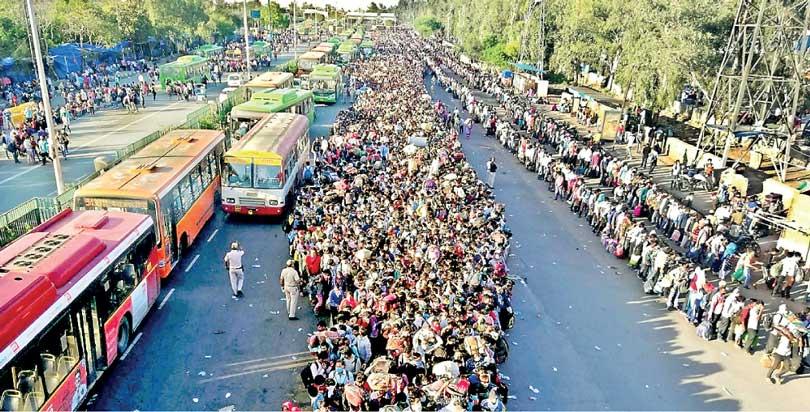Reply To:
Name - Reply Comment
 Migrant workers at a city bus stand
Migrant workers at a city bus stand
 One of the most striking things which the COVID-19 pandemic brought to India was the sudden, panicky and mass flight of rural migrants from the country’s sprawling cities to their native villages hundreds or thousands of kilometres away. The flight, triggered by the nation-wide lockdown clamped on March 24 by Prime Minister Narendra Modi without prior notice as a desperate measure to check the virulent spread of the virus, led to blockades and violence in several parts of North India.
One of the most striking things which the COVID-19 pandemic brought to India was the sudden, panicky and mass flight of rural migrants from the country’s sprawling cities to their native villages hundreds or thousands of kilometres away. The flight, triggered by the nation-wide lockdown clamped on March 24 by Prime Minister Narendra Modi without prior notice as a desperate measure to check the virulent spread of the virus, led to blockades and violence in several parts of North India.
The Indian States (provinces) had closed their borders and so the police blocked the workers’ paths and baton-charged those who tried to break the road blocks. In Delhi, the government filed cases against officials who had allowed the workers to leave their homes en masse and assigned buses to transport them to the main bus stand. Stopped from leaving cities which no longer gave them room, work and sustenance, the migrant workers were in a most pitiable condition.
 This phenomenon, which got prime time attention in TV channels across India for days together, has opened the eyes of at least a section of the Indian ruling class which had hitherto taken the migrant workers from the rural areas for granted. The poverty stricken rural migrant workers were essential to build the cities’ roads, high rise buildings and posh apartments, but once these were built, they were expected to disappear into thin air or languish in unhygienic shanties.
This phenomenon, which got prime time attention in TV channels across India for days together, has opened the eyes of at least a section of the Indian ruling class which had hitherto taken the migrant workers from the rural areas for granted. The poverty stricken rural migrant workers were essential to build the cities’ roads, high rise buildings and posh apartments, but once these were built, they were expected to disappear into thin air or languish in unhygienic shanties.
Since the migrants are not permanent residents they are not entitled to “ration cards” which will enable them to buy basic necessities at government-fixed prices. Being “unauthorised” their areas of habitation are not entitled to civic facilities like water, electricity and clinics. As a floating population, politicians do not see them as “vote banks” and therefore they do not get political attention and assistance.
But their problem is huge and crying for attention as India has an estimated 120 million rural-to-urban migrant workers, who contribute 10% of the country’s economic output.
Aajeevika Bureau’s Recommendations
Aajeevika Bureau, a Rajasthan-based non-profit organisation, has produced a report on “circular migrants” with recommendations meant to recognise this essential community and factor their needs into urban planning and development. “Circular migration” or “repeat migration” is the temporary and usually repetitive movement of a migrant worker between home and host areas, typically for the purpose of employment.
The bureau’s report entitled: “Unlocking the Urban: Re-imagining Migrant Lives in Cities Post-COVID 19” stresses the need to give the work being done for the migrant workers to have a “legal mandate”. It says that enabling migrant workers to claim access to basic services as a matter of “entitlement” and not “charity” will go a long way in empowering them and avoiding undue dependence on the benevolence of employers or local informal providers, thereby reducing the possibility of extractive practices.
It calls for the designing of mechanisms to ensure access to reliable,reasonably priced, high quality public services which will help reduce the arbitrariness that is otherwise associated with access, and consequently, bring down the large mental and physical strain that accompany such efforts.
A common feature observed across vulnerable migrant groups is that they are unable to purchase the minimum consumption items for a dignified life in the city, as they earn sub-optimal wages and are restricted to the lowest rungs of the urban labour market.
“In order to ensure a minimum standard of living for these communities, basic facilities and services have to be directly provided by the State or employer, or in cases where it is purchased from the market, it has to be subsidised by the State or the employer. State or employer liability, responsibility and accountability must be clearly fixed, based on the differentiated needs of these groups,” the report says.
Migrant workers use social networks to get work and to get their daily needs and these networks must be encouraged to exist.Other major stakeholders in ensuring social support networks for migrant workers in the city are workers’ own unions or collectives, and NGOs and Community-Based Organisations(CBOs) that might be working directly with these communities. These institutions must be encouraged by the State and the political system.
The role of both workers’ unions and NGOs/CBOs in responding to the needs of these communities or creating platforms for collective support and bargaining should be factored into policy design.
Gender Differentiation Needed
Any solution aimed at provisioning for circular migrants must attempt to reduce the work burden of migrant women who otherwise have to expend strenuous labour in the social reproduction of the migrant households in frugal and impoverished conditions.
Food, fuel, health and sanitation provisioning must necessarily be gender-friendly, with a view to addressing the lack of safety, as well as physical, mental and sexual harassment faced by women due to an absence of basic facilities, the report recommends.
Gender-sensitive urban planning and policy design with a focus on the historic marginalisation and frequent mobility of these communities, which currently disproportionately burden women, should be an important response.
Recognition of
Informal Networks
Circular migrants living in different spaces in a city have demonstrated ingenuity and creativity in using these spaces to fulfill their different individual and community functions, carving out spaces, structures and relationships in the city which help them meet their unique needs. The State needs to take cognisance of,and learn from, these informal systems and processes while developing policies and plans for urban development.
Don’t Insist on Domicile
Most importantly, the provision of basic facilities and services must be de-linked from permanent domicile status or tenure security in the spaces that are occupied by circular migrants.
While on the one hand, building up documentation or assets in the city is along-term strategy that groups of migrant workers might undertake in the city to become semi-settled or permanent residents, many groups pursue multi-local and mobile lives,without settling down in a single place.
But regardless of their diverse trajectories in the city, circular migrants contribute to the cities’ economies through their labour, even where they might not be able to assume the status of ‘vote-bank’ or ‘tax-paying’ citizens. A recognition of the relationship of circular migrants to cities’ economic growth can form the basis of advocacy for extending facilities and services to spaces they occupy in the city.
Policy and planning, therefore, can be based on access to basic facilities and services in existing informal settlements of circular migrants – and should be able to accommodate their circular and seasonal mobility patterns across cities and their villages, which should be recognized as a key livelihood strategy for these groups.
Regardless of their diverse trajectories in the city, circular migrants contribute to the cities’ economies through their labour, even where they might not be able to assume the status of ‘vote-bank’ or ‘tax-paying’ citizens
Recognise And Provide For Diversity
The report suggests that rather than attempt to aggregate the experiences of these varied groups of migrants under the undifferentiated category of ‘circular migrants’ or the broad-stroke imagination of ‘urban poor’, an important exercise while designing and implementing policies and schemes should be to disaggregate these different groups,based on their unique needs and preferences in the cities,which are determined by the nature of their employment and their living spaces.
Following this, the responsibilities of the State and employers in subsidizing the consumption of these different groups can be fixed and appropriate accountability mechanisms can be set up. The report says that such an exercise will be a step towards overcoming the dichotomy between urban governance and labour governance, by clearly delineating the responsibility of the State and employers towards realising both the citizenship and labour rights of circular migrants.
As things stand, neither the State nor the Employer has a legal or statutory responsibility towards the migrant worker. The absence of that was stunningly and brutally brought home to Indians by the COVID-19 pandemic.